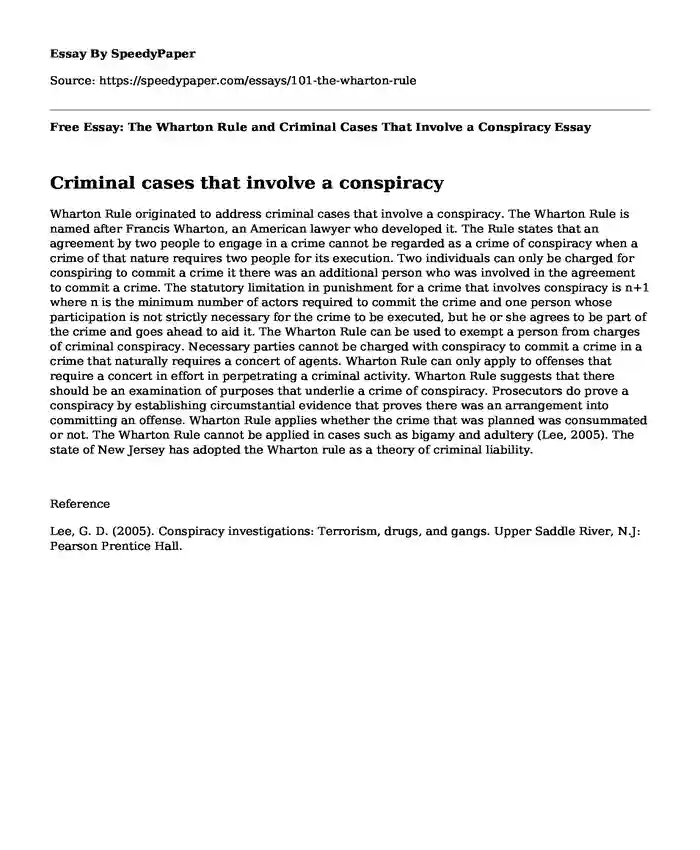
| Type of paper: | Essay |
| Categories: | Criminal justice |
| Pages: | 2 |
| Wordcount: | 301 words |
Criminal cases that involve a conspiracy
Wharton Rule originated to address criminal cases that involve a conspiracy. The Wharton Rule is named after Francis Wharton, an American lawyer who developed it. The Rule states that an agreement by two people to engage in a crime cannot be regarded as a crime of conspiracy when a crime of that nature requires two people for its execution. Two individuals can only be charged for conspiring to commit a crime it there was an additional person who was involved in the agreement to commit a crime. The statutory limitation in punishment for a crime that involves conspiracy is n+1 where n is the minimum number of actors required to commit the crime and one person whose participation is not strictly necessary for the crime to be executed, but he or she agrees to be part of the crime and goes ahead to aid it. The Wharton Rule can be used to exempt a person from charges of criminal conspiracy. Necessary parties cannot be charged with conspiracy to commit a crime in a crime that naturally requires a concert of agents. Wharton Rule can only apply to offenses that require a concert in effort in perpetrating a criminal activity. Wharton Rule suggests that there should be an examination of purposes that underlie a crime of conspiracy. Prosecutors do prove a conspiracy by establishing circumstantial evidence that proves there was an arrangement into committing an offense. Wharton Rule applies whether the crime that was planned was consummated or not. The Wharton Rule cannot be applied in cases such as bigamy and adultery (Lee, 2005). The state of New Jersey has adopted the Wharton rule as a theory of criminal liability.
Reference
Lee, G. D. (2005). Conspiracy investigations: Terrorism, drugs, and gangs. Upper Saddle River, N.J: Pearson Prentice Hall.
Cite this page
Free Essay: The Wharton Rule and Criminal Cases That Involve a Conspiracy. (2019, Jan 22). Retrieved from https://speedypaper.com/essays/101-the-wharton-rule
Request Removal
If you are the original author of this essay and no longer wish to have it published on the SpeedyPaper website, please click below to request its removal:
- Free Essay Example: Reducing Supplier Evaluation Cycle Time
- Historical Essay Sample: Abraham Lincoln's Plans for Reconstruction of United States
- HR Essay Sample: Challenges and Solutions of Recruitment and Selection
- Barrack Obama Essay Example
- Free Essay with the Article Review: Effects of Coping Strategies on Stress and Psychology
- Free Essay on Porter's Competitive Strategies
- Essay Sample on Interventions on Reducing HCV Prevalence in the Incarcerated Population
Popular categories




